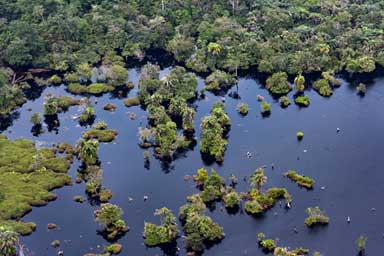Congo's Oil Ministry Accused of Greenwashing

KINSHASA, Jun 16 (IPS) - Nine of the 16 oil blocks to be auctioned in the Democratic Republic of Congo (DRC) next month overlap Protected Areas, according to a review of official government maps by Greenpeace Africa.
Minister Didier Budimbu, who had previously insisted that “none” of the blocks overlaps Protected Areas, confirmed Greenpeace’s findings in a statement yesterday.
Plans to auction rainforest for oil were reactivated in April, five months after the signature of a $500 million forest deal signed with the Central African Forest Initiative (CAFI) at COP26.
Greenpeace Africa and others have expressed alarm that three of the blocks overlap with the Cuvette Centrale peatlands, a biodiversity hotspot containing about 30 gigatons of carbon, equivalent to three years of global emissions. Oil drilling could release the immense stocks of carbon they store, warned Professor Simon Lewis of University College London.
That Protected Areas are also at risk became apparent last month when the Hydrocarbons Ministry itself published a video featuring a map of six of the 16 blocks : five of them are clearly shown to overlap Protected Areas.
The voice-over praises the "meticulousness" with which blocks had been "selected," mindful of environmental “sensibilities,” and claiming input from unnamed environmentalists.

Another official online source, the Environment Ministry Forest Atlas of the Democratic Republic of Congo, shows nine of the blocks overlapping Protected Areas, including a national park, nature reserves, and a mangroves marine park.
The Ministry’s statement to Greenpeace Africa asserts: “It’s been decided that Protected Areas containing mineral natural resources of high economic value will be degazetted.”
While it describes the overlaps as “very negligible,” a simple review of the map shows significant overlap in at least three cases, including that of Upemba National Park, part of which occupies about a third of the Upemba block.
Irene Wabiwa Betoko, International Project Leader for the Congo Basin forest at Greenpeace Africa said: “The auction of new oil blocks anywhere during a climate crisis that disproportionately affects African people is mad.
Greenwashing the auction of blocks overlapping peatlands and Protected Areas is the height of cynicism. Doing so with such amateurism is particularly disturbing.”
In its statement to Greenpeace Africa, the Ministry emphasizes that no areas inside UNESCO World Heritage sites are up for auction and that overlaps are restricted to other Protected Areas. Congolese law, however, makes no distinction, in terms of oil exploration, among Protected Areas.
Block 18, one of the few that doesn’t encroach on a Protected Area, is only about twenty kilometers from Salonga National Park, a UNESCO site. In July 2021, the DRC government succeeded in removing Salonga from the List of World Heritage in Danger after it promised to update UNESCO, no later than 1 February 2022, on "the progress made towards the definitive cancellation of the oil concessions” there.
Over two months after the deadline, the government reported that the park's steering committee decided on 14 December 2021 to "initiate actions for the definitive cancellation.” Instead of finally acting, the government continues planning to act.
“The mouth that says all the right things about the climate and biodiversity crises works separately from the hand that signs the contracts that make them worse. This disconnect also characterizes DRC’s donors: their COP26 speeches in praise of the Congo rainforest have resulted in an agreement that is an open invitation to oil companies,” added Irene Wabiwa.
The agreement signed at COP26 does nothing to protect peatlands of the Cuvette Centrale from the oil and gas industry, and is hardly more demanding with regard to the integrity of Protected Areas.
Instead of banning extractive industries in them, the 2 November letter of intent seeks only damage control. It calls for a study “to determine to what extent the titles of hydrocarbons overlap with and/or have an impact on protected areas, with a view to adopting appropriate prevention or mitigation measures ”.
Greenpeace Africa calls on the DRC government to cancel the auction of new oil blocks: “Instead of auto-pilot steering Congo into a climate catastrophe, the government and the international community must invest in ending energy poverty by accelerating investments in clean and accessible renewable energies,” concluded Irene Wabiwa.
Tal Harris is International Communications Coordinator, Greenpeace Africa: and Raphaël Mavambu is Communications and Media Consultant, Greenpeace Africa.
IPS UN Bureau
Follow @IPSNewsUNBureau
Follow IPS News UN Bureau on Instagram
© Inter Press Service (2022) — All Rights Reserved. Original source: Inter Press Service

